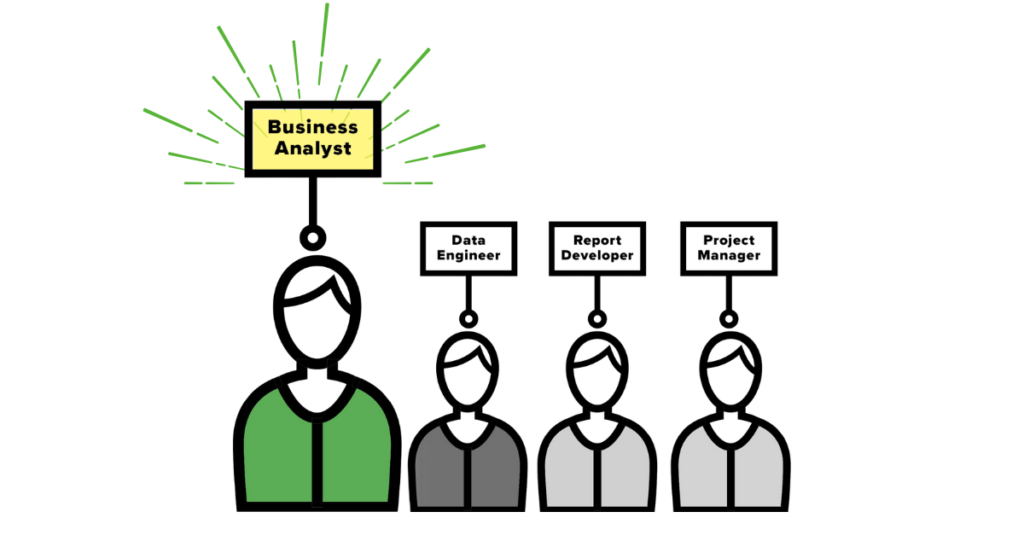A good business analyst can be a game-changer for your business, helping you translate complex data into actionable insights to identify and eliminate inefficiencies—but hiring a business analyst is a complex task in and of itself.
You need to find someone who has the right balance of business and technical skills and who can be the right match for your company’s culture, goals, and long-term vision. Plus, small- and mid-sized companies have the added challenge of trying to find and retain top, full-time business analysts while managing limited resources.
Before you rush to hire a full-time business analyst, this post covers what you should consider, plus an alternative that may be a better fit for SMBs.
What Does a Business Analyst Do?
Broadly, a business analyst (BA) assesses processes to recommend strategies for greater efficiency, better performance, and improved outcomes. More specifically, they identify a business’s primary needs and recommend solutions to better meet those needs. This can include analyzing market trends, deploying new technology, and suggesting and overseeing operational improvements. At the same time, a BA must ensure all individual projects align with the company’s overarching goals.
Altogether, it’s quite the balancing act. In a nutshell, here are the three main responsibilities of a business analyst:
1. Gather Requirements
At the start of every new project, a BA meets with all key stakeholders to discuss and thoroughly understand their unique requirements. This step is not just another round of meetings in a meeting-filled day; rather, it is foundational to the success of all future projects. By taking the time to carefully gather and document requirements, a BA ensures that no one department is prioritized over others and that future solutions meet the needs of all involved parties.
Ultimately, investing time in this process helps prevent wasted time, money, and resources by helping you avoid mistakes early on so you don’t have to shift gears and course-correct later on.
2. Analyze Processes
Perhaps above all, a BA identifies inefficiencies and helps propose new solutions and optimizations to rectify them.
This requires taking an intense, careful look at current processes. For example, a BA may:
- Map workflows to identify areas for improvement
- Conduct gap analyses to compare current processes and desired outcomes
- Analyze data trends to find patterns
- Identify bottlenecks to determine causes for delays
- Review documentation to ensure it’s accurate and up to date
3. Communicate with Stakeholders
You know that BAs have to meet with all key stakeholders to gather requirements for a new project—but that’s not the end of their communication responsibilities.
BAs must maintain consistent communication with all relevant stakeholders throughout optimization processes. In doing so, they also frequently serve as a liaison between business and technical teams. This can be a particular challenge as these two teams often have conflicting ideas. It’s up to the BA to ensure each team understands the other’s needs and challenges to ensure the company ultimately achieves a final, cohesive project that satisfies each team’s unique pain points.
What Are the Characteristics of a Good Business Analyst?
Remember that a BA’s main role is to identify inefficiencies and oversee optimization. Doing so requires bridging the gap between business and technical teams, which means BAs need to have the right mix of technical know-how, business acumen, and communication skills.
It’s not an easy balance. Above all, a good BA should be an analytical thinker, an active listener, and an adaptable problem-solver.
1. Analytical Thinker
As BAs analyze processes and develop recommendations for new optimizations and efficiencies, they must examine minute details without losing sight of the big picture.
In other words, they need to be able to break down complex problems into smaller, more manageable components to create actionable steps for improvement. This requires keen analytical thinking skills, as well as the ability to synthesize and dissect complex information and then communicate it clearly.
2. Active Listener
Clearly, communication skills are paramount for BAs, as they are responsible for presenting new optimization strategies and explaining their benefits to diverse teams. Listening is, unfortunately, often overlooked as a communication skill, though it, too, is critical for strong collaboration and alignment.
Consider: As BAs heed the needs of often disparate technical and business teams, they have to not only understand these teams’ different points of view but also help align their potentially conflicting priorities to rally them behind common goals and objectives. Spearheading compromises isn’t always easy, but a good BA will know that strong communication starts with being a good listener.
3. Adaptable Problem-Solver
No matter how conscientiously and carefully a business analyst gathers stakeholder requirements at the start of the project, there are bound to be changes along the way. For example, stakeholders may change their needs mid-project, budget constraints may arise, or new technologies may require you to reevaluate existing solutions.
A good BA knows that environments are always changing—and they’re prepared to pivot. Above all, they know how to problem-solve and come up with new solutions as needed to ensure business continuity despite disruptions
3 Main Challenges in Hiring a Business Analyst
Finding a BA who can strategically identify inefficiencies, bring diverse teams together to develop new solutions, and then lead the way for smooth implementation is a tall order. The task is even more difficult if you want to hire someone who fits your company’s internal culture and needs.
These are the three biggest challenges in hiring a BA:
1. Not a lot of people can balance business and technical knowledge
A good BA should have one foot in the technical world and one foot in the business world. This is the primary reason why filling a BA position is so challenging.
On one hand, a BA should have sufficient technical knowledge to be able to engage with technical teams, understand their pain points, identify areas for improvement, and offer real, useful solutions. At the same time, they also need to be able to communicate those needs efficiently to business decision-makers and ensure all processes and new implementations are in line with the company’s overarching goals. It’s simply difficult to find someone with this dual skillset.
2. Industry-specific requirements will narrow your search further
Technical qualifications for BAs can be even trickier to fulfill depending on the nature of your business.
For example, if your company is in finance, healthcare, or another highly regulated niche, then a run-of-the-mill BA may not be able to sufficiently analyze processes and provide the relevant insights needed to optimize operations. For these niches that require very specific technical knowledge, the BA candidate pool is even smaller, making it harder to onboard the right employee who can understand, support, and improve your business.
3. It’s tough to attract high-demand talent
More companies are relying on data, with Gartner predicting 65% of organizations will be fully data-driven by 2026. In turn, this means that demand for BAs is high—and growing. The Bureau of Labor Statistics predicts employment of business analytics will grow by 11% from 2021 to 2031, almost three times the average.
5 Top Interview Questions to Ask When Hiring a Business Analyst
BAs can be pivotal to the overall success of your company, so there’s a lot of pressure to make sure you hire someone who has the technical knowledge and business intelligence needed to turn data into strategic, actionable insights.
How can you separate the good candidates from the bad?
These five BA interview questions can help you narrow your search:
1. In your opinion, what is the role of a business analyst?
This question might seem basic, but it can give you a good idea of how a potential BA will approach their responsibilities at your company. Importantly, it can reveal whether or not you are aligned on big-picture values and if they fit in with your company’s needs, culture, and vision.
2. How do you gather and validate requirements?
A strong answer should detail a candidate’s experience with different methodologies, such as conducting interviews, leading workshops, delivering surveys, etc. Since gathering accurate requirements is a foundational task in a BA’s ultimate success, it’s important to understand how a candidate would tackle this responsibility at your company.
3. How do you prioritize conflicting stakeholder needs?
A big part of a BA’s role is to balance priorities from different and sometimes conflicting teams. You need someone who knows how to manage expectations when stakeholders have competing demands, determine the urgency and impact of each request, and propose solutions that fulfill your company’s overall goals while still ensuring all parties feel heard and valued.
4. Can you describe a project where requirements changed late in the process? What did you do to course-correct?
Even if you hire the most skilled BA, sometimes things will still go wrong.
When that happens, you want to have confidence that your BA can manage the stress, keep a cool head, and develop solutions to course-correct while mitigating damage. With this question, you can assess their ability to adapt in difficult situations and keep projects on track to meet goals.
5. How do you measure the success of the projects you’ve worked on?
This question helps you determine what a candidate prioritizes. For example, are they hyper-focused on ROI? User satisfaction? Process improvements?
Sometimes, BAs pay too much attention to the little details and lose sight of whether or not their actions are ultimately leading to the desired end results. Above all, you want to work with a BA who knows how to think critically and move the needle on tangible business outcomes that are important to you.
3 Red Flags When Hiring a Business Analyst
As you conduct interviews, remember that these questions don’t necessarily have right or wrong answers. The role of a BA is nuanced, and identifying good and bad answers isn’t always black and white.
Still, you want to be on the lookout for a few red flags that can be strong indicators this BA is not the right fit for your business:
1. Generalized Responses
Overly vague or generalized responses can be an indicator of a lack of experience. This BA may be overstating their qualifications on their resume—without having enough real-life experience to back it up.
2. Too Much Attention to Specific Tools
On the other hand, if a BA gets too specific in their answers, that’s not necessarily a good sign, either.
Particularly, if a BA spends too much time talking about specific tools, then it may be an indication that they don’t have experience with any other tools and/or aren’t flexible enough to adapt to different environments. Plus, paying too much attention to the ins and outs of a specific tool can signal an inability to see the big, overall picture—a necessary skill since BAs must propose specific solutions that align with broader business objectives.
3. Poor Communication Skills
This is perhaps the most important red flag to watch out for.
Yes, a good BA will have relevant business and technical experience. But a huge part of their job is communicating—specifically, communicating with different departments and translating their diverse ideas into a cohesive set of actions.
If a BA can’t express themselves well in an interview or if they struggle to clearly convey ideas, then it’s not likely they’ll be able to do a better job once you hire them. In particular, watch out for long-winded, jargon-filled answers that don’t actually respond to your question.
How Much Is a Business Analyst Paid?
Many factors contribute to a BA’s final salary, including their experience level, education, niche industry, location, etc. Plus, options for bonuses or different benefits can also affect their take-home paychecks.
Estimates on the national average for a BA’s salary fall between about $84,000 and $99,000 per year, though there are more accurate estimates on the state level.
Why Is It Hard to Find a Good Business Analyst?
A good BA should have a mix of business know-how and relevant technical skills, which isn’t always easy to find, especially if your company requires particularly niche technical experience. But the real challenge in hiring a good BA isn’t just finding them—it’s retaining them.
We already know that more companies are relying on data and looking for business analysts to support them. But a report from McKinsey also revealed that the United States has a shortage of 140,000 to 190,000 people who have analytical skills and know how to use data analysis to drive decision-making.
Together, this spells high demand for and short supply of BAs, which makes it hard to attract and retain good talent. This is especially true for small companies who still need the skills of a good BA but may be unable to compete with the lucrative salaries and benefits packages that larger companies can offer.
What Happens If You Hire the Wrong Business Analyst?
If you’re struggling to find a BA who’s the right fit for your business, don’t settle. If you end up hiring the wrong full-time BA, you run the risk of facing:
- Misaligned requirements
- Insufficient planning
- Poor project execution
- Scope and budget creep
- Unrealistic deadlines
At best, a wrong-fit BA means missed opportunities; at worst, it can spell costly failures and lost business growth.
Consider Hiring a Fractional Data Team Instead of a Business Analyst
BAs have a lot of responsibility, and their actions can directly translate to the overall success of your business. But with BAs in high demand, it’s hard for small and mid-sized companies to compete with the offerings of bigger companies with bigger wallets, which means it’s harder for you to attract and retain the full-time BAs you need to support your business goals.
But hiring a full-time BA isn’t your only option. Instead, you can work with a fractional data team.
A fractional data team delivers the advanced technical knowledge, business acumen, and analytical skills of a BA—and a lot more. Altogether, a fractional data team gathers, analyzes, and manages data to provide insights that drive decision-making and support strategic business initiatives, doing the work of not just BAs but also that of data architects, ETL developers, report developers, project managers, and data operations managers.
Plus, a fractional data team relieves you of the responsibilities and commitments of hiring and onboarding full-time employees, giving you access to expertise, talent, and skills—only when you need it.
Before you consider hiring a business analyst, learn more about what it’s like working with a fractional data team and how it can help you reap the benefits of a BA without the long-term commitment.







